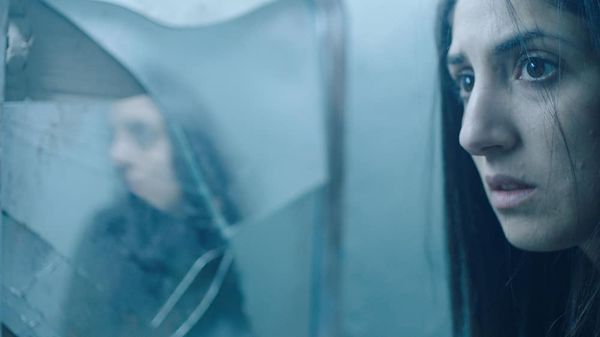Eye For Film >> Movies >> Dachra (2018) Film Review
Dachra
Reviewed by: Jennie Kermode

Yassmine (Yassmine Dimassi), Bilel (Bilel Slatnia) and Walid (Aziz Jebali) are journalism students planning a documentary as a class project. One of them suggests that he can use his contacts to get them into a local psychiatric hospital, where one of the inmates is said to be a witch. They don't take witchcraft seriously (though many people in their native Tunisia do), but they're interested in exploring the subject of belief. In due course this leads them into the woods and to a lonely village where everything they believe is turned on its head.
This may sound like familiar territory, but the magic is in the execution. There's a scene early on in which the three argue as they drive to the hospital. We look at the across the bonnet of the car they are in, which evidently hasn't been cleaned for a long time. When the next shot reveals a pale expanse covered in little black dots, it's not clear at first what we're seeing; the implication is that this is the view through the windscreen. In fact we're looking directly at the whitewashed wall of the institution, and as the characters appear, walking along the base of it, this trick makes us acutely aware of the vastness of the building, foreshadowing the way that they will be dwarfed by the situation in which they find themselves.

The film is full of directorial flourishes like this, and they have a secondary purpose, drawing our attention away from what Abdelhamid Bouchnak wants us to see but not fully take in. There's some fantastic sleight of hand at work here, so even if your guess parts of the plot early on, there are likely to be other things which you don't see coming. And then, beyond this, there's another layer of story, one whose enormity you might not take in fully until some time after viewing is complete. Bouchnak isn't interested simply in exploring the horrors to be found in some remote communities (which, we are reminded at the end, are all too real) but sets out to expose systemic failings which are very much a product of modernity. The prejudices that make this possible are manifest in the protagonists' own attitudes when they enter the hospital - and if the corridor into which the nurse leads us whilst explaining "We keep the disturbed patients down here" reminds you of The Silence Of The Lambs, you may note that this is an issue in Western countries too.
Despite the closeness of the central trio ("We are like cousins," they explain), time is not divided equally between them. It's Yassmine whom we follow, and Yassmine has a secret: for all that she turns up her nose at talk of the supernatural, she has been having a series of dreams so disturbing and abnormal that her uncle Béchir (Bahri Rahali) has encouraged her to see a sheikh and to repeat words from the Quran as a form of protection. He has been responsible for her since she lost her mother and the tenderness between the two is beautifully played, even though we can see that she has reached a stage in her life where she wants to break away. When they part we feel the absence of that support structure, making her seem all the more vulnerable out in the woods.
There are echoes of The Blair Witch Project here, of course, but Dachra draws on a different folkloric background and uses its darkness in a different way. The traps he sets are much more complex. Dimassi makes a terrific lead, convincing in the big dramatic scenes but coming across elsewhere as so ordinary that there's a real sense of dislocation and weirdness about the developing situation, something that's hard to sell to contemporary horror audiences. This is an unusually clever piece of genre cinema which also resonates emotionally. It will leave you eager to see more from Bouchnak and his stars.
Reviewed on: 07 Jul 2021















